#meta tag;
Explore tagged Tumblr posts
Note
I'm very interested in how Aizen would have reacted right after his loss to Ichigo to questions from Central 46 or other people (yk rangiku, izuru, shunsui maybe) who would like to talk to him about Gin Ichimaru, asking him why he killed his follower. Will he be honest at least in the fact that he knows that Gin betrayed him? How will he feel hearing their questions?
Well, the short answer to this is fairly simple: Aizen wouldn't be saying shit to anyone, especially not if they're asking him about Gin and what happened during Deicide. It's not their place to know anything about that.
The longer answer is much, much more complicated. Time for a read more. This answer's going to be fairly extensive.
Aizen is, and always has been, an extremely private individual. He's allowed very few people to get close to him and no one's gotten as close to him as Ichimaru Gin has managed to do. Kaname and Momo put Aizen on a pedestal, with Kaname going so far as to all but worship him whilst Momo truly believed he was nothing more than her gentle, kindhearted captain. The point here is that neither of them truly saw Aizen as a person; they only projected onto him their ideal image of him. Kaname venerated Aizen like unto a god and Momo's emotions over Aizen were colored by her affection and love over his kindness and warmth. Even his Espada idolized him, even though Aizen already warned them not to trust him; he very clearly stated that that wasn't anything that he remained interested in. It's actually quite intriguing that, for a man who wanted to fill the vacant throne in the heavens, he actually never has enjoyed being worshiped like a genuine god. There's something that could be said about that.
None of them actually beheld Aizen properly and the Espada followed him out of fear, respect of his strength, or because they genuinely did believe in him.
Gin, on the other hand? Gin actually perceived Aizen, saw him, right from the first time that they met. @godkilller and I have built a very massive dynamic for them, and we're ever discovering new facets of how they are, how they feel, and how they behave with one another. So when I say that Gin saw Aizen, it has to come with the caveat that for the first time in over a century, Aizen found himself not only seen but perceived on a level no one else had given him since he'd been a young boy. All it took was that first meeting on that night when Aizen watched him kill the old man Third Seat and the resultant way that inspired Aizen to take Gin underneath his wing.
And, above anything else, it has to be remembered that Aizen's character has always been one defined by loneliness. He was around others, but Aizen never truly belonged with others. Did he ever really feel accepted into the Division? No, not entirely, and a major factor of that was Shinji who kept him at arm's length, especially emotionally, but remained willing to fuck his lieutenant after some years had passed. Meanwhile, Aizen was, at that time, deeply in love with him. And we all saw how that went; eventually, Aizen's anger and growing hate for him burst the dam and Aizen decided to commit murder for a number of reasons.
But before that happened, Gin showed up in his life and genuinely changed the trajectory that Aizen was on. In a very real way, Gin saved Aizen from himself and the path he was heading down. He managed to pull Aizen from that brink of total despair and despondency. There is no way I can possibly overstate how important Gin became to Aizen, but it can be seen in canon; Aizen's behavior in the Blood War after Deicide is far, far different from how he had been prior to that point after he revealed his ambitions to all of Soul Society. He's withdrawn. He doesn't want to engage in conversation. He's downright apathetic to everything going on and, for that matter, he's become something of a death seeker.
And it's so very obvious when you think about the biggest factor of why that is: Gin isn't there to engage with him, or to make sure that Aizen doesn't hold onto that malaise for an extended period of time. Aizen is very literally full of depression and given his behavior in the final act, there's no way you can convince me that he isn't trying to get himself killed.
The point of stating all of this is because I always have to find ways to convey and emphasize just how profound Aizen's attachment to Gin became; even platonic, it's a genuinely massive loss for Aizen. Throw emotions into that mix and it becomes much, much more painful.
But even without the emotions or anything romantic thrown in, it's still clear that Gin appealed to Aizen in several ways. There was, of course, Gin's raw potential, even at such a young age which excited Aizen to no end, but there's also the fact that he challenged Aizen and was unpredictable to a greater extent than anyone else ever has been. Even Urahara Kisuke couldn't make Aizen guess what he'd do the way Gin can and Kisuke is, as we all know, a very prepared man for any fight. But he's still predictable to Aizen who can come up with countermoves if he really wished to.
Gin, though? Gin kept him guessing and that was a genuinely large part of why he became so important, and that isn't even touching on the fact that Gin was able to become a viable death-threat. That alone captivated Aizen's attention, due to the fact that not only did Gin manage to consistently be unpredictable to him, but he also managed to force Aizen to acknowledge that out of everyone he knew, Gin remained a genuine source of providing even faint flickers of fear and kept Aizen on his toes.
There's also the fact that Gin never idolized Aizen, never put him on any sort of pedestal, and never once tried to be obsequious towards him. In fact, Gin's been downright bratty and sharp-tongued towards Aizen in many ways and instead of being an irritating factor? It was only once again a reason why Aizen found his relationship with Gin to be so appealing to him. Gin's willingness to challenge him, call him out on his actions and behavior and words, and carrying a genuine threat of being able to not only actually harm Aizen but to possibly kill him?
How could Aizen have resisted that kind of appeal?
The fact that Gin was able to perceive him and see through those careful illusions of himself he'd built up in the public eye was absolutely one of the strongest factors for why Aizen took Gin under his wing and soon trusted him above even Kaname was absolutely one of those facets of their relationship that is always important to remember, too. It was that, more than anything, which really made Aizen decide that he wanted to keep Gin close - but the other factors are equally important. Aizen had no one to challenge him for years and given that no doubt brought a profound ennui to his life, Gin was an open breath of fresh air.
I did say the longer answer would be more complicated, didn't I?
Aizen's dealings with the Central 46 are always going to be the same; contemptuous needling or a lack of a response at all. I'm pretty sure if he hadn't been restrained the way he was on the day of his trial in that kangaroo court, he probably would've killed all the replacements to the original slaughter that he, Gin, and Kaname undertook when they were setting their plans into motion. He would never answer their questions, at all, even if they didn't pertain to Gin. He just generally holds that body of bureaucrats in constant disdain. The most they'd get out of him is his mouthing off which is what led to that sentence of 20, 000 years. He has no reason nor desire to ever be polite to those individuals and I imagine that won't ever change. He knows the secrets of the Seireitei and he knows how much those old men will prefer to focus on his actual crimes rather than ever ask him about what happened with Gin as it is. If they ever did ask a question about that, it'd probably be only in passing. The result would be the same, however; Aizen just would not answer them and never plans on doing so. He might, however, be thinking of how nice it'd be to drop a full-chant Kurohitsugi on them all.
But, as for those others...
I don't think Rangiku or Izuru would technically be allowed to speak to Aizen, given what I've read between the lines of what was being done to him leading up to his trial, but if they were? The answer wouldn't change at all.
Aizen is, as I said before, an extremely private man. He wouldn't even be able to begin processing his own emotions over such a profound loss, let alone be able to answer the questions that others posed to him; not very easily, I should say. So if Rangiku and Izuru came to him to ask those questions, Aizen would probably use all manner of ambiguity, bending of the truth, and generally talking circles around them until he managed to make them leave him be -- that is, if he even answered them at all at that point in time when he's beginning to process what happened, or at least to begin realizing that what occurred was his own fault.
He knows, of course, that Gin had an attachment to both Rangiku and Izuru; Rangiku was his Academy classmate and someone who obviously holds Gin in high regard and Izuru was his lieutenant and with him since the day that Aizen decided the most competent of the recruits would become second-in-command to Gin, which is a factor I think some people forget about. But also, Aizen thought of Izuru as the most competent out of all the potential lieutenants that he was considering for Gin and Kaname and therefore picked out Izuru for him. Kind of like a present, you could say. A very weird present, but a present nonetheless, because he wanted Gin to have the advantage there.
So, if they were allowed to see him, they wouldn't get very far with him. If Aizen doesn't want to answer a question, he is quite good at simply closing his mouth and staring the person in question down. I think that'd be how he'd handle it if Izuru and Rangiku were trying to get answers out of him. To him, what passed between himself and Gin is theirs and he isn't willing or interested to let anyone on the outside of that dynamic behold the nuances and complexities therein, especially if he and Gin were involved with one another. It's, quite simply, not their place to know and it isn't information that will be useful to them.
Out of all of the three people listed, I think only Shunsui would be able to get any kind of response that might remotely come close to being an answer to such questions, if you tilted your head upside down and squinted. But only remotely as Aizen wouldn't give him very much information either and anything that he possibly would say would only be surface level at best, nothing that can be confirmed easily or, alternatively, the information would be only what everyone already knew. I do think that Shunsui and Ukitake would be the first (and, perhaps, only) people who'd recognize it if Aizen and Gin wound up in a relationship together and I also think that Shunsui would be able to know that there wouldn't be any good answers, even if Aizen and Gin weren't involved. But it wouldn't stop him from asking until Aizen decided enough was enough and simply chose to remain close-mouthed and make it clear that he was done.
Pertaining to the emotional aspect? Oh, he wouldn't be enjoying any of those experiences. Aizen came out of Deicide wounded by what had happened, deeply so. Their asking questions of him when his emotions are already a tumult within him, trying to find out any information on why he did what he did, wouldn't be something that he'd show. But if capable, he'd absolutely do his best to shut them down and shut them out. Asking questions that pry into the privacy of a man emotionally devastated won't do any good and instead of getting angry with them and shouting? Aizen's much more likely to just, simply, shut down and do nothing, say nothing, until they leave, especially since those questions would be pertaining to Gin. It's an awful mess and Aizen really isn't a man who's good at handling his emotions in a good fashion.
So, in sum, I don't think that he'd ever give anyone a comprehensive answer, if he even answered any questions about Gin in the first place. It's a subject that's both too personal and too painful for him to ever speak on to anyone else and it'll remain that way for years, even decades, perhaps even centuries. He's a mess, especially once everything really starts to sink in for him, and there's nowhere for him to turn for support or help, especially not when he's locked up in Muken.
#ask tbt;#anonymous#meta tag;#it's been a while since i used that tag#and it feels good to use it again#hell it's been a long time since i belted out a response to an ask as long as this one#i am reviving if i can
3 notes
·
View notes
Text
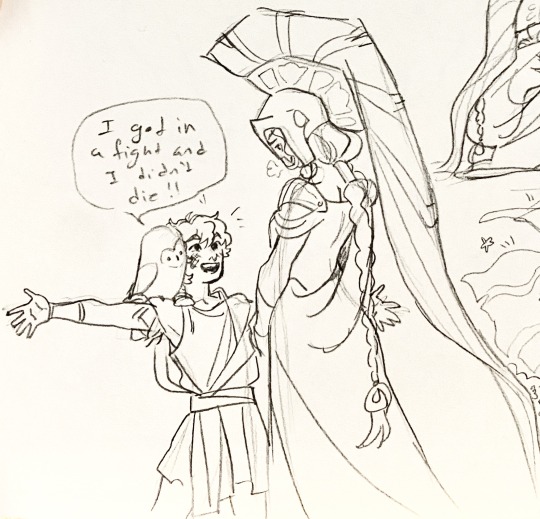
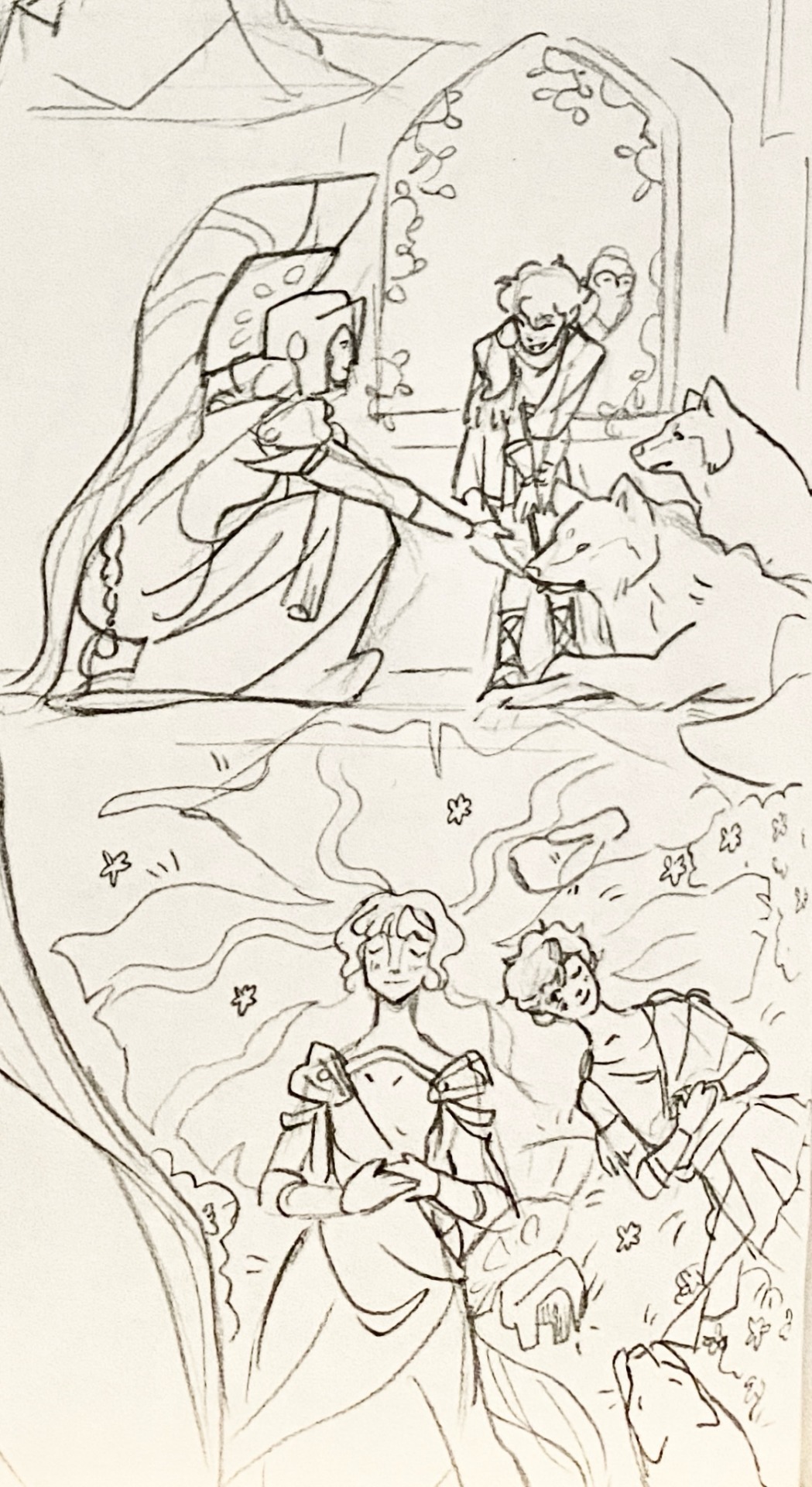
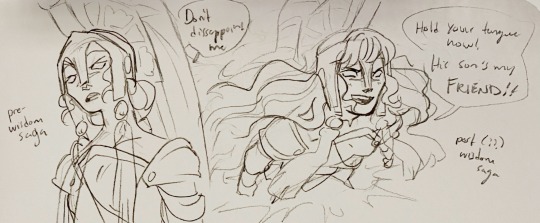
Personally I think that Telemachus permanently and irreversibly changed Athena for the better, more on that at twelve
#I’m sorry for the WORST possible quality pictures and sketches#but they’re fr all I can think about#wisdom saga is where I live now#epic athena#epic telemachus#epic the wisdom saga#epic the musical#epic the musical fanart#sorry to do meta in the tags bug#I think the idea that telemachus’s friendship might have turned Athena into the person she got upset with Odysseus for being#would be delicious#also if you see any inconsistencies in character design or clothes no you didn’t#can’t wait to be able to digital again holy fuck
16K notes
·
View notes
Text
absolutely insane episode as per fucking usual but perhaps most insane detail of all that's gonna get glossed over is the reveal that the birthing cabin was made specifically to facilitate the severed women WHOM JAME EAGAN GOT PREGNANT. not only has he been siring bastard children on mistresses THOSE MISTRESSES WERE INNIES. he's been leveraging his position as the ceo (which in lumonspeak is basically the head of the church, a pseudo-deity figure) to manipulate and seduce women already lacking in personhood whom are emotionally children and then shipping them off to be hidden away when he leaves evidence behind. remember the news broadcast in season 1 mark was watching about a severed woman who became pregnant at work. we finally have an answer to how that happened. it really is just a means of enacting violence against women all the way down huh!!!
7K notes
·
View notes
Note
isnt it wild how jayce is the most heavily misunderstood arcane character..everytime i see takes about him being upper-class and rich or mean and condescending or not caring about viktor in s1 or whatever other garbage ppl say about him i lose a year of my life
It's crazy to me that I've been saying jayce is working class for years and this got confirmed in the draft 1 board for arcane christian linke posted on twitter sometime ago lol

house Talis is a MINOR HOUSE of toolmakers whose most prominent contribution is the 'collapsible pocket wrench'. They're literally blacksmiths. This is a service and labor position. Jayce can't even afford to use gold in his inventions in act1 because he relies on the Kiramman money for everything. This is not the life of a rich guy in Piltover this is middle class at best lol his drive to finish up hextech and succeed academically is him trying to build a better life for himself!

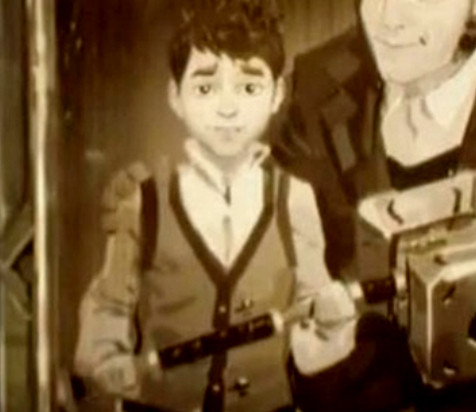
Blacksmithing is historically a very intensive work position. The work wears you down & eventually disables you very early in life (jayce's injury in act3 seems to be a metaphorical speedrun of that, in some ways) we're never told how jayce's dad died but it is very fair to imagine it was a work related. he's fucking aware of this, its true In Real Life and it brings such an interesting context to his interactions with Viktor and how they want to create things that help common laborers and make the work better if it wasn't for the council. (in s1 act2 their progress day showcase to heimerdinger BEGINS with jayce complaining that they've been stuck fulfilling the council's demands these past 10 years and now, finally, *finally* it's their time to decide what to do with hextech. and they're not even allowed that.)
Also, the perfected hexgems in s1 are kept in Kiramman-crest boxes. I noticed this just the other day. JAYCE AND VIKTOR DON'T OWN SHITTTTTTTTTTT they're getting exploited big time while all that 'investor' money is charged back with deep dividends

just like real life academics they probably spent most of their life writing up grant proposals like dogs and begging for funding that will wring them dry later on. Where the hell is all my jayce and viktor class solidarity 'getting drunk off their mugs and complaining about their dipshit bosses' content?
[related post]
MARCH 2025 UPDATE: just got my Arcane artbook and it directly confirms the Talis family legacy is not big industry, because those weren't even part of the world. It is only post-timeskip that we start to see ramped up production + Jayce's focus is giving magic to the common people.
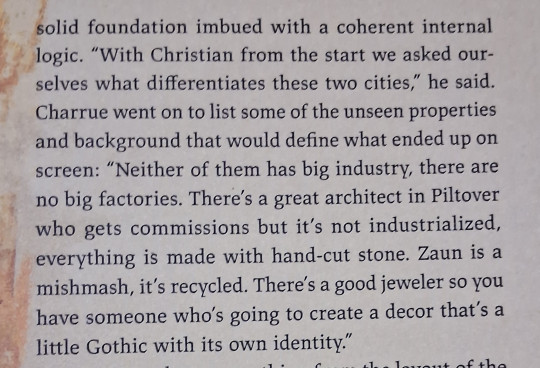
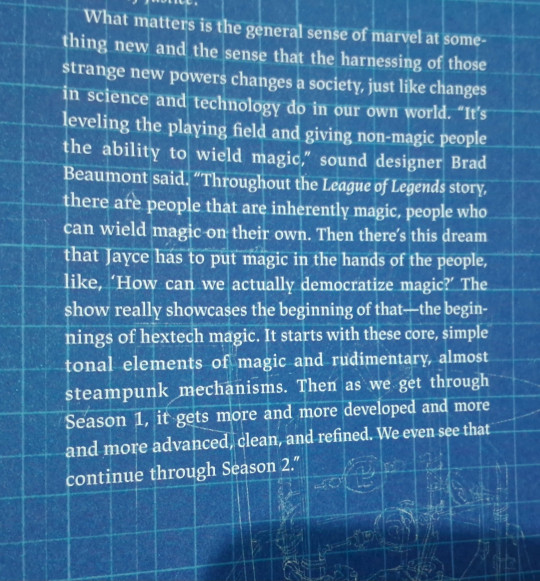
#jayvik#arcane#meta tag#jayce talis#viktor arcane#jayce arcane#vikjayce#viktor lol#jayce lol#viktor league of legends#jayce league of legends#league of legends#hexposts
5K notes
·
View notes
Text

nothing personal but this kind of comment rlly exemplifies to me a disconnect between canon and popular fanon jmart characterization because they almost literally had this conversation in canon - except, their lines are swapped!


jon, for all his scared grouchiness, is a secret romantic, while martin, for all his forced optimism, is at his core a pragmatist
#and it's not like it's a throw away line either#its the penultimate episode and leads directly into the 'Where you go I go - that's the deal' convo#and this isnt the first time I've seen people swap them#otherwise i wouldn'tve made a whole post#tma#tma s5#tma finale#jonmartin#tma meta#stole the screenshot from another post because i didnt want to derail what people are mostly reblogging for a cute moment#and y know. it IS cute. that's why it's so weird that people seem to forget how it's nearly literally canon#EDIT: added that tag to the body of the post cause its rlly the conclusion
9K notes
·
View notes
Text
One of my fav authors just said in their authors note that Sam and Dean retire from hunting like Hayao Miyazaki retires from film making. Which is literally soooo perfect…
Like they are DONE. They are OVER IT. Dean gets a job at a garage and watches too much Food Network. Sam’s working on a dissertation on American folklore. And then he’s conducting an oral history section of his thesis and the “Sasquatch” sighting his subject is describing is REALLY starting to sound like a wendigo….
And of course there are other hunters and they could pass it off. But they’re so close and they basically did all the research already and the undergrad Sam hired for help w interview transcription is just gonna keep poking her nose in it if it doesn’t get taken care of soon.
Anyways, this is the last one. After this, they’re DONE. For real this time.
#also can you tell how much i love history major sam….#that boy likes research and knowledge for knowledges sake WAY too much to be a lawyer be ffr#spn#supernatural#sam winchester#dean winchester#spn meta#mine#as always obligatory#wincest#tag#sams advisor assumed they were married when dean kept showing up w lunch#and now they’re in too deep
2K notes
·
View notes
Text
Utena truly said what if Eurydice knew from the start that Orpheus would look back. She knows that this is how the story must end. Orpheus remains optimistically oblivious as he trudges forward. Eurydice waits for him to look back. Look back already, as other so-called "heroes" would. He does not look back. He climbs the crags and steps of the Underworld even as Hades accosts him, leads him down and down and down back to the depths. She wants him to look back, look back and end this spiraling journey of cliffs and chasms. That is how the story ends, after all. Is he purposefully denying fate, or does he truly not know what is to come? All stories have a certain end. He does not look back. She begins to ask him to look back, to beg in woven myth to let it be done already. She throws herself off a cliff, Look back, look back, watch me fall and know that it is done. He casts his head aside as he grasps her arm in his hand. He does not look back. He reaches the precipice, where the story must end even as all else has failed. He is shown a future (a fantasy) without sorrow, without her. He does not look back. Forward, forward. He thinks himself a hero. "Look back," a blade pierces his chest, "look back at your killer. Let this story end, as it should, as it will, for you are no prince." He does not look back. Forward, forward, as rock gives way to dirt. He collapses at the maw of Hades, dewkissed grass at his fingertips. He does not look back. Eurydice steps into sunlight.
AN: Holy shit this blew up
I’d greatly appreciate it if anyone seeing this checked out the addendum as well for a more rounded perspective/a short glimpse at my full opinions on the matter that aren’t filtered through Orpheus and Eurydice. Also, to anyone seeing this who hasn’t watched Utena yet (I’ve seen y’all in the tags), welcome!
#This was way better when I was driving and couldn't write the exact wording I wanted down#demons won so bad#utenanthy#utena tenjou#anthy himemiya#utena meta#ish#revolutionary girl utena#rgu#sku#shoujo kakumei utena#it's been a hot minute since I've done all those tags#ohtoriposting
3K notes
·
View notes
Text
Shipping is fun and all but I swear every single time someone makes a comment, whether as a joke or in a legitimate analysis, about there being "no other explanation" for a pair's interactions, I lose just a bit more of my sanity
Like, no, you guys don't get it. Romance is not about the Amount of devotion, it's about the COLOR. the FLAVOR of it all. a character can be just as devoted to their platonic friend as they are to their romantic partner, and they don't love either of them more, just differently.
But because the majority of people still have it stuck in their minds that romance exists on the highest tier of love, I'm stuck seeing endless takes that boil down to "these two care about each other too much for it to NOT be romantic" as if that's the core determining factor to how literally any of this works
In conclusion: stop telling me that I don't understand the story if I don't interpret the leads as romantic, I am TIRED
#analysis#meta#miscellaneous#fandom#shipping#media discussion#amatonormativity#lgbtq#I feel like tagging any of the fandoms I was thinking of when writing this would be a little mean-spirited potentially#Disclaimer: no one has actually been telling me personally that I don't understand any story in particular#It's just that the way people tend to phrase their analyses feels unnecessarily targeted at the reader and that's just. not great#even if I agree with every other point they make
25K notes
·
View notes
Text
while i did a gifset to showcase an armour set, i was also intrigued by just how different the animation is for the wizard class vs gale's unique animation:
wizard class animation

gale's unique animation
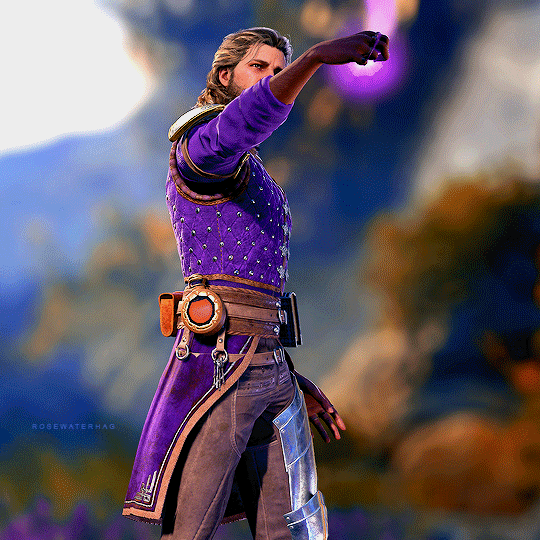
it's amazing to see not only just how quickly gale performs the somatic component of the spell, but also his efficiency of movement compared to the standard wizard animation.
there's a world of difference here, the difference between a wizard vs a prodigy, an archwizard and chosen.
#gale dekarios#gale of waterdeep#baldur's gate 3#bg3#baldurs gate 3#ch: gale dekarios#vg: baldur's gate 3#series: baldur's gate#meta: mybg3#i saw someone say in the tags once that faerun can be happy that gale is kind and good-hearted and not v much like the typical(tm) wizard#in dnd#and yeah.................................
6K notes
·
View notes
Text
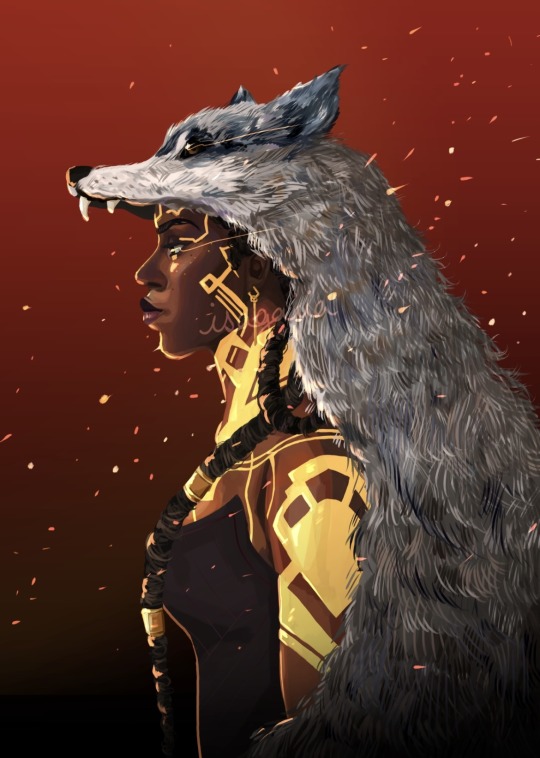
you are the wolf
#funny bc when I was drawing this my mom was like is that a wolf or a fox on her head and I was like... that's so meta you dont even know#hate how I ended up doing her armour but we move!#mel medarda#arcane#arcane fanart#mel arcane#mel medarda fanart#artists on tumblr#fanart#isagaiia#my art#digital art#csp#my art 2024#I hope everyone finding that j4yvik one finds this but alas#sorry didn't realise that last tag would put it in the j$yvik tag apologies!!!!!#arcane spoilers#arcane season 2
3K notes
·
View notes
Text
Yeah okay so like I said in the tags of the last post I’m rising from my tumblr grave to say that the ban on TikTok is symptomatic of a MUCH larger and more terrifying problem. Because yes, on its surface it’s silly dances and asmr and cooking videos and whatever, but in truth and at its core, TikTok single-handedly revolutionized the way 170 million Americans communicated with each other AND the rest of the world. Non-Americans love to point out how America-centric Americans are, but fail to realize that we are purposefully raised in an isolated, insulated environment where we are told from basically day 1 that America Is The Best and not to even bother taking a look around because it’s all downhill from outside of here. TikTok has, for MANY Americans, single-handedly destroyed that notion and allowed them (us!!) to broaden our world-view and realize that actually, things are better in other countries, and it did so in a kind, empathetic, and compassionate way.
And yeah most people wake up to the truth of that on their own as they get older, but holy shit!! The VAST majority of the Americans on TikTok are millennials and gen z (and even some older gen alpha)!! People who are becoming disillusioned with “The American Dream” (said with the HEAVIEST sarcasm) while they’re still school-aged or are just entering young-adulthood!! People who are entering - or TRYING to enter - the American workforce who suddenly have an unfiltered window into non-American lives and are wondering why tf we’re struggling and penny-pinching and toeing the line of poverty while our rich elected officials sit around and fight and argue over everything that actually matters to the citizens they supposedly represent and get richer all the while. THAT is why they’re banning the app, and that fact alone should terrify every single American citizen.
Not to mention the precedent it sets for other social media platforms!! You think some nebulous, unproven, and unfounded “threat to national security” will stop with TikTok?? They’ve already censored Adult Material on tumblr, who’s gonna stop them from coming back and doing it again or getting rid of it altogether for the exact same reason? It’s a blatant act of censorship and a direct attack on the American first amendment right to free speech.
NOTHING radicalized me the way tiktok did. I watched people in my life who were STAUNCH Trump supporters in 2016 AND 2020 wake up to the truth and vote blue for the first time in their lives BECAUSE OF TIKTOK, and did so with al the nuanced understanding that even Democrats are severely failing this country, but are at least better than the alternative. That level of awareness and presence in the average US citizen scares American politicians.
The fact that the vast majority of them - including the ones loudly opposing the ban!! - bought stock in Meta BEFORE the ban was legalized/upheld by the Supreme Court?? That Mark Zuckerberg and Elon Musk were legally allowed to lobby congress to ban TikTok when BOTH stood to DIRECTLY financially gain from their biggest competitor being banned in the US and are guilty of unethically gathering data and selling it to MULTIPLE third parties?? The fact that Trump is now teasing that he may or may not intervene to save TikTok when he was the one who talked about banning it in the first place AND ALSO OWNS HIS OWN COMPETING SOCIAL MEDIA PLATFORM??
It’s the burning of Alexandria. It’s the loss of a significant chunk of culture. It’s the sharp and sudden loss of contact with the rest of the world for more than half of all American citizens. It’s the loss of $240 BILLION dollars in the GDP when the country is already TRILLIONS of dollars in debt. And on an individualistic level, it’s the loss of millions of small businesses and primary income streams for so many individuals and families who found their primary audience on TikTok. Is the app perfect? HELL no. Are there significant changes needed to make it a safe environment for all users? ABSOLUTELY. But that can also be said of ANY social media platform. TikTok openly fostered connection and communication and creativity and compassion that is completely unique to that platform! It made so many people - myself included!! - feel less alone. I get the feeling I know what the general consensus is about TikTok on this site, but the ban on this app should scare the shit out of everyone.
#TikTok ban#TikTok#mark zuckerberg#elon musk#donald trump#I’ve been gone for like 3 years at this point but I can’t say quiet about this#and as this is the only sort-of platform I’ve got#if you want to do something to help#delete ALL meta apps off your phone#not your accounts just the apps themselves#Facebook#Instagram#facebook messenger#WhatsApp#all of them#this + the fact that I traveled outside the US for the first time in my life last year has really fundamentally changed who I am#I’m just honestly so infuriated#as are most people on TikTok#anyway back to tagging senators ro khana and ed markey in every tiktok I scroll past byeeeeeee
3K notes
·
View notes
Text
i'm expecting a tiktok exodus since this seems to be the bomb shelter of the internet. have another update/repost. NOW WITH HIGHLIGHTED MAJOR HOLIDAYS!
IT JUST HAPPENS
DAY 15 GIVE IT UP FOR DAY 15
Thursday the 20th
The Fifth of Wednesday
Second Week of May: Eurovision
Sometime in June: That One Halloween Post Starts Circulating
Sometime in July: Dancing Pumpkin Man Video/Gif
First Monday In September: Todaybor Day Is Labor Day
WEEKLY EVENTS (at least the ones i celebrate)
Every Monday: Garfield Hates Mondays
Every Tuesday: Tuck Him In Tuesday
Every Wednesday: It Is Wednesday My Dudes
Every Thursday: Out of Touch Thursday
Every Friday: Thank Gnome It's Friday
Every Saturday: Caturday
Every Sunday: Energy Sword Sunday
YEARLY EVENTS
January 1: Copyright Expiration Day
January 2: New Years, New Tears
January 8: Spiders Georg Day
January 16: Appreciate a Dragon Day
January 18: Bug Race
January 29: Threshold Day
All of February: Funguary
ALSO All of February: Femslash February
February 3: WOE, VANILLA EXTRACT BE UPON YE
February 8: King Taejong Fell Off His Horse
February 13: Galentines Day
February 14: Aromantic/Asexual Day
February 15: Annoy Squidward Day
February 18: Perserverance Rover's Birthday
March 9: Miku Day
March 10: Mario Day
March 14: Pi Day
March 15: Ides of March
March 23: Ever Given Got Stuck Today
April 1: Mishapocalypse
ALSO April 1: Staff Does Something Fun On The Dashboard
April 2: Dashcon Announcement Anniversary
April 3: Dannypocalypse
April 5: First Contact Day
April 8: Rex Manning Day
ALSO April 8: MARGARET THATCHER IS DEAD
April 13: Neil Banging Out The Tunes
ALSO April 13: Homestuck Day
April 19: Some Roman Made Bread Today
April 20: haha 420 blaze it
April 24: Josh Fight
April 25: The Perfect Date
April 28: Ed Balls Day
April 29: 94 Meetings Day
April 30: It's Gonna Be May
All of May: Mermay
May 3: Beginning of Dracula Daily
May 4: May the 4th Be With You
May 5: Revenge of the Fifth
May 6: Revenge Of The Sixth
May 7: World Language Day
May 25: The Glorious 25th of May
ALSO May 25: Towel Day
All of June: Pride Month
ALSO All of June: IT'S HALLOWEEN TIME TO GET SPOOKY
June 5: Barricade Day
ALSO June 5: RONALD REAGAN IS DEAD
June 12: Another Homestuck Day
June 16: Let Papyrus Say Fuck
June 22: Summerween
June 23: FUCK This Post And Happy Birthday Sonic
All of July: Disability Pride Month
July 11-13: Dashcon Anniversary
July 20: Moon Landing
August 5: Curiosity Rover's Birthday
August 30: Frankenstein Day
September 8: The Queen Is Dead and Sans Undertale Killed Her
September 11: Mole Interest Monday
September 19: Talk Like A Pirate Day
September 21: DO YOU REMEMBER-
All of October: SKELETON WAR
ALSO All of October: People Draw A Lot Month? (so many names)
October 3: Mean Girls Day
ALSO October 3: Fullmetal Alchemist Day
October 13: Treat Yo' Self
October 18: None Pizza Left Beef
October 20: Unnecessary Feelings Day
October 25: Homestuck Day The Third??
October 31: HALLOWEEN
November 5: Destiel Nevada Putin Elec'tion Covid Way
ALSO November 5: Doc Brown Invents Time Travel
November 19: Goncharov
November 29: HENRY KISSINGER IS DEAD
All of December: Will the Gävle Goat Get Destroyed Again?
ALSO All of December: WHY WEREN'T YOU AT ELF PRACTICE
ALSO All of December: Season's Greason's
December 4: Deny Defend Depose Day
December 10: Please, It's Christmas
December 12: Hawaii Part 2
December 23: Christmas Adam
ALSO December 23: Festivus
December 24: ALMOST CHRISTMAS MEANS IT WASN'T CHRISTMAS
ALSO December 24: Cabinet Man Day
December 25: happy chrismum
December 27: Porn Ban Effective Today
#there's definitely more but i'm not versed enough in this#tumblr holidays#add more in the tags/comments please#look i'm trying my best here i've been on tumblr for just over a year at this point#tumblr#tumblr calendar#holidays#calendar#the calendar updates have become a yearly occasion now#if you have other additions get 'em in by next year#also this update finally has some august holidays!!#tiktok ban#tiktok refugees#meta refugees#instagram refugees
32K notes
·
View notes
Text
i read this post on tumblr the other day that talked about how dick's time at haly's as part of the flying graysons made him particularly receptive to bruce's teaching methods to the point where bruce thought 'wow parenting is easy!' and then immediately got the next kid killed ://
and honestly? yea

dick's training as a flying grayson really is an overlooked part of his backstory. he already was doing death defying stunts and back breaking training! that was normal for him! and that probably 1) gave him a thing for perfectionism even before bruce, 2) primed him for bruce's specific brand of bat training and other neuroses and 3) made him think that yea, ofc, none of this is a big deal.
its amazing. truly the duo of all time.
#batman#dc robin#batman and robin year one#batman and robin#dick grayson#bruce wayne#nightwing#dick grayson meta#mine#wednesday spoilers#bruce wayne's c+ parenting#saw someone use it as a tag and i'm stealing it i'm so sorry
1K notes
·
View notes
Text
the whole severance process and its subsequent success being manufactured from and built upon the labour and suffering of two women. one a child who designed severance to cope with the reality of the world she was forced into, and one being a woman of colour who was kidnapped and turned into a toy to be used at the whims of a white man. and you all wanted to know why ms huang is a child. well here is your answer. a teenage girl of colour currently under the same scholarship as cobel happily and matter-of-factly carrying out the subjugation of people who only exist because of what lumon exploited out of people like her. lumon having entire institutions dedicated to the continued indoctrination of vulnerable children. lumon systematically ensuring any amount of class or race consciousness or solidarity between their subjects is impossible by having them carry out each other's exploitation on their behalf. the innies just being a new rung at the bottom of the ladder whom the disenfranchised and marginalised can feel empowerment in stepping over. and ms huang is just the next in a long, long line of victims
#ITS CAPITALISM ALL THE WAY DOWN.#severance#severance spoilers#meta tag#harmony cobel#gemma scout#ms huang
7K notes
·
View notes
Text
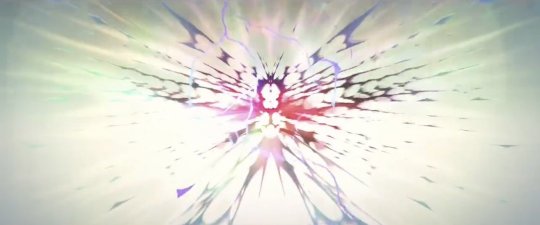
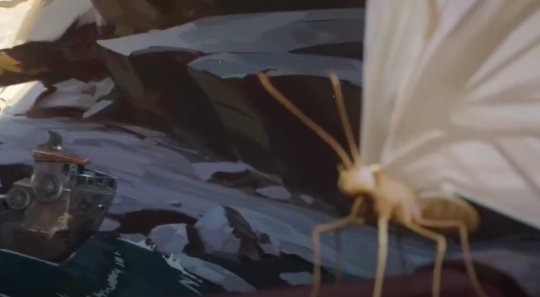
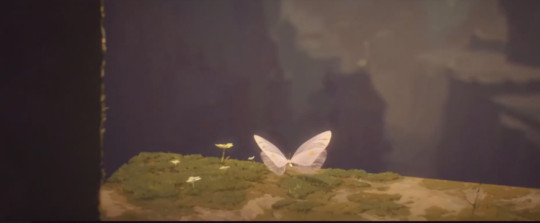


stealing this from @godsplatter but. Jayce & Viktor's dream butterfly. their dream.
THEIR RED STRING OF FATE THE ANOMALY OF THEIR LOVEEEEE
#jayvik#arcane#jayce arcane#viktor arcane#arcane spoilers#vikjayce#jayce league of legends#league of legends#viktor league of legends#jayce talis#jayce lol#viktor lol#hexposts#meta tag
4K notes
·
View notes
Text

kirby test print
3K notes
·
View notes